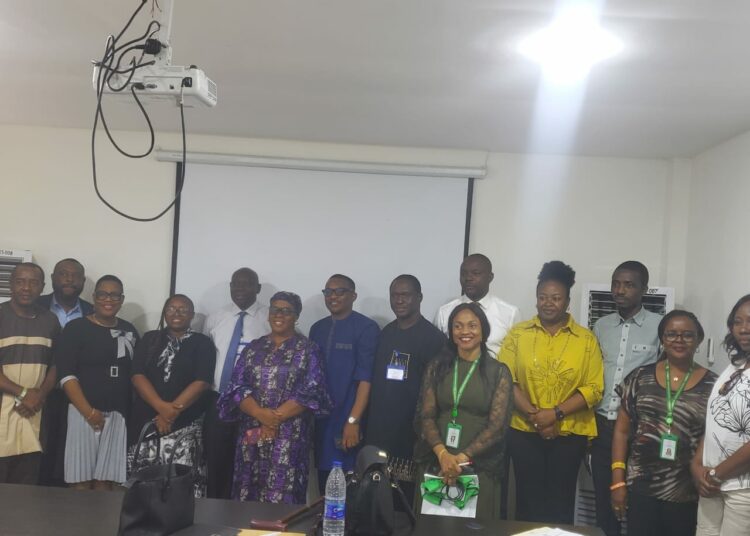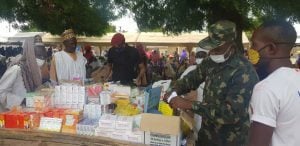The federal government through the National Health Insurance Authority (NHIA), has partnered with pharmaceutical giant Roche to reduce the cost of cancer treatment by up to 80 percent in 24 accredited treatment centres nationwide.
Under the arrangement, the total cost of selected high-end cancer medications, particularly chemotherapy drugs, will be split among the three parties: Roche will shoulder 50 percent, NHIA 30 percent through its Health Maintenance Organisations (HMOs) while patients will pay just 20 percent of the treatment cost.
Additionally, a flat ₦10,000 service charge per chemotherapy cycle will be applied, significantly easing the financial burden typically associated with cancer care.
Key stakeholders from NHIA, Roche, and Federal Medical Centre (FMC), Ebute Metta, Lagos, have reaffirmed their commitment to this cost-sharing model that promises to transform the cancer care landscape in Nigeria.
The acting managing director of FMC Ebute Metta, Dr Saheed Ogunme, at the MoU signing, on Wednesday, in Lagos, described the partnership as a game-changer for cancer patients in Nigeria.
“Funding remains our greatest challenge in healthcare delivery. This initiative is a significant opportunity to develop systems that not only attract but also efficiently absorb funding. It is a feat of pride for FMC Ebute Metta to be designated a centre of excellence in this national cancer care expansion,” Ogunme said.
He lamented the low penetration of health insurance in Nigeria, noting that only an estimated 10 percent of the population, primarily those in the formal sector, currently have health insurance coverage. “Clearly, this is unsustainable.
That is why a tripartite arrangement such as this becomes critical to achieving universal health coverage,” he added.
The deputy director at NHIA headquarters, Mrs. Oluwayemisi Femi-Akinbinu, said the cost-sharing model is part of a broader NHIA–Roche Research and Supply Chain Initiative, which includes three pillars: branding and visibility, cost-sharing, and innovative financing.
The program began as a pilot in seven centres of excellence across Nigeria, where essential oncology medications, particularly for breast cancer, were tested for access and affordability. Data gathered from the pilot revealed significant barriers, including the need for patients in Lagos to travel to Ibadan for treatment, defeating the purpose of access.
“This is why the current expansion to 24 centers is crucial. The model ensures sustainability, equity, and access. We are starting with public health institutions, but private providers will be engaged as well,” she said.
She emphasised that the program targets chemotherapy treatment specifically and does not affect NHIA’s broader coverage for other ailments.
To address long-term sustainability, NHIA is advocating for the establishment of a Catastrophic Disease Fund, which will cover cancer, renal conditions, and sickle cell disease. If approved by the president or minister of health, the fund is expected to provide a financial safety net for patients with high-burden illnesses.
“Strategic health purchasing will also be introduced, meaning providers will be reimbursed based on measurable outcomes like surgical success or patient satisfaction,” Mrs Femi-Akinbinu said.
Healthcare system partner–policy at Roche Nigeria, Babarinde Olayode, said the company’s goal is not only to make life-saving medications more accessible but also to protect patients from the financial catastrophe that often follows a cancer diagnosis.
“We observed that with health insurance support, patients could stay on medication longer, up to 17 or 18 cycles compared to just three to five before the pilot. This dramatically improved survival outcomes,” Olayode said.
He noted that most beneficiaries were aged 35 to 59 who are economically active Nigerians and whose restored health contributes positively to national productivity. “The partnership is about more than just cost reduction. It is about equity, early diagnosis, standard of care, and patient navigation,” Olayode said.
Roche also supports the programme with automated diagnostic systems by partnering with the Federal Institute for Biomedical Research. For example, automated immunohistochemistry (IHC) testing has already begun at LUTH-NHIS, enabling timely and accurate diagnoses. The initiative also includes a patient navigation tool that allows individuals to locate the nearest accredited centre, helping eliminate socioeconomic and geographic disparities in care. Medications provided under this scheme will be branded with “NHIA Users Only” labels, allowing easy identification and usage tracking.
The programme spans 24 centres across Nigeria, including teaching hospitals and Federal Medical Centres in Lagos, Abuja, Calabar, Jos, Maiduguri, Makurdi, Owo, Bauchi, Umuahia, and others. Each centre has been equipped to deliver high-quality cancer treatment and support under the new model.
To streamline operations at FMC Ebute Metta, Roche recommended establishing an NHIA liaison office near the oncology unit to assist with enrollment, approvals, and navigation. They believe this will ensure no patient falls through the cracks.
“Together, we are not just cutting costs, we are redefining health equity in Nigeria. Let us continue working so that no patient is left behind,” Olayode added.






